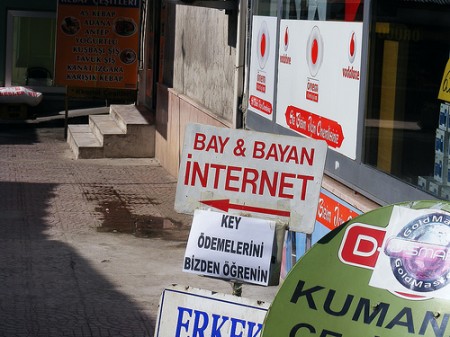There are 2.6 million registered personal computers linked to the internet in Turkey today. For a country with 70 million inhabitants this does not appear to be an impressive figure. But in fact, internet use is more widely spread than it seems. Most of Turkey’s users access computers in their working places, internet cafés and in schools.
But who is active in the Turkish Civil Society 2.0?
Here are some insights from a GMF workshop held on June 5th.
Ertuğrul Kürkçü, journalist and coordinator of the BIANET project explains that the public use of the internet plays a very important role in the lives of Turkey’s young and old. Kürkçü’s website is based on this premise. It represents a unique project that approaches Turkish issues from the point of view of human rights, encompassing children’s rights, gender issues and minority issues. BIANET is not only available in Turkish: it also translates news from local media into English.
New content meets new media
The internet in Turkey has allowed discussions to break taboos. As an example, take the issues dealing with the Kurdish minority. Most probably, what we have nowadays in terms of Kurdish TV channels and the free Kurdish music production would not have been possible without the internet. In the early days of the internet in Turkey, the exchange of music was important. This allowed the free distribution of Kurdish music on the web, something that would not have been permitted via the more traditional media. A whole discourse on the Kurdish issue became possible on – and because of – the world wide web. It enabled the spread of the Kurdish language and culture.
Other sensitive political issues made it to the internet, too. A quite impressive example is the conciliatory website that caused furor when it was launched last year, together with a “we are sorry” campaign, targeted at asking for forgiveness for the Armenian Genocide. A group of 200 Turkish intellectuals signed an online petition “apologizing” to Armenians for their suffering at the hands of Ottoman forces during the First World War.
Any news on the Youtube front?
Yes, Turkey still bans Youtube. When asked in 2008 when the ban on Youtube was to be lifted, the answer Turkey’s PM Recep Tayyip Erdoğan came up with was: “I can watch Youtube, and I am sure, so can you.”
Of course, you could say that we are not dealing with a real ban here. But it is interesting to learn how this website, meant for mere video sharing, transformed into a big political platform and started bothering the Turkish establishment.
When it comes to the freedom of speech, one should also mention that Article 301 is still a big issue in Turkey. This controversial article of the Turkish Penal Code makes it illegal to insult Turkey, the Turkish ethnicity and / or the Turkish government.
But even if trials and censorship controls do exist, take the example of BIANET. It has existed for 9 years now and the project has had no problems with censorship whatsoever.
Self-censorship as a means to overcome repression
Ertuğrul Kürkçü explains that one reason for why BIANET has not been bothered by the authorities lies in the website’s way of approaching the issues and of covering reality: “BIANET’s speech will not trigger censorship, its aim not being agitation and propaganda.”
It is print media that is more affected by bans in Turkey. One could argue that censors have not yet arrived in the Turkish Civil Society 2.0. But I’d say we should not be expecting them to do so in the future either. Controversial websites manage to escape especially when (and because) their domain is not Turkish. Having a foreign domain means that one is outside Turkey’s jurisdiction and the judges are helpless when it comes to suing.
Kürkçü argues that Turkey’s situation is not to be compared with that of, for example, Syria. According to him, the biggest problem faced by Turkish journalists is self-censorship. “It’s the way we have to change our language and thinking when we write. We start to think and write in a less harmful, less assertive way.”
How about the impact on political decisions?
Is the political order being challenged by the discussions taking place on the internet in Turkey? The answer to this is: Not really. According to Kürkçü, there are two types of reactions from the part of the establishment. One is neglecting the internet forums altogether. This seems to be the basic attitude of the state. In very rare cases the state might choose to embrace and discuss issues. Kürkçü has witnessed this second reaction, too. The government of the city of Istanbul was following what BIANET was writing about it. In order to make peace with the journalists, the Istanbul government invited BIANET editors to a conference about how the relations between the media and the state could be improved. Somehow I doubt that any of the BIANET journalists responded.
***
There are other interesting organizations dealing with the freedom of the press, human rights issues and policy discussions in Turkey. In the ISN IR Directory we feature the Human Rights Association (HRA), the Economic Policy Research Foundation of Turkey (TEPAV) and the Turkish Economic and Social Studies Foundation (TESEV).


